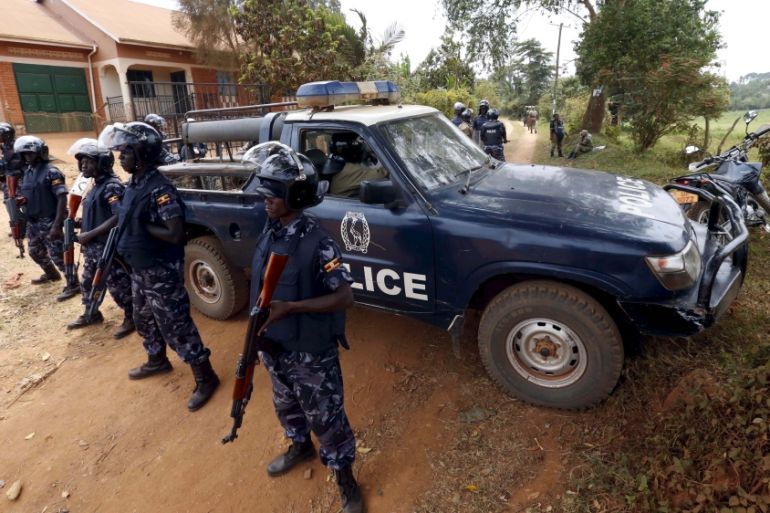Uganda jails Muslim leader Sheikh Kamoga over ‘terror’
Defendants and rights lawyer say Tabliq head Sheikh Kamoga and others were wrongly charged in ‘purely political’ ruling.

A Ugandan court sentenced a Muslim group leader and three associates to life in prison on “terrorism” charges, a judgment denounced by some as the latest in a series of anti-Muslim rulings.
Sheikh Mohammad Yunus Kamoga, who heads the Tabliq group, and 13 others were arrested and charged with “terrorism” and the murder of other Islamic group leaders.
In a High Court session on Tuesday, Kamoga and three Tabliq members were sentenced to life, while two others were given 30 years each.
But a day earlier, six of them were convicted on “terrorism” charges, but all were cleared of murder. The court had acquitted the group of murder because prosecutors failed to place any of them at the scenes of crime.
“I find the decision very unusual because the main case was about the murders and the terrorism was arising from the murders, so if they were not guilty of the murders then they should be not guilty of the terrorism,” said human rights lawyer Ladislaus Rwakafuzi.
This week’s conviction is the latest in a series of cases where Muslims have been blamed for the murders of officials and Islamic scholars.
The cases include the murders of nine Muslim scholars since 2012; of Joan Kagezi, a prosecutor working on the 2010 Kampala bombings case, in March 2015; of an army officer in November 2016 who had defected from a Ugandan-led rebel group in eastern Democratic Republic of Congo; and of a prominent policeman in March.
In each case, the victims were shot dead by motorbike-riding assassins, and in each case, Muslim suspects were rounded up.
Evidence for Muslim involvement in the high-profile killings was flimsy at best, Rwakafuzi said.
“The Muslims are being profiled … We have very poor, underfunded investigation mechanisms. It’s an easy way out to show to the public that you’re doing something about these killings.”
Muslims were being targeted, he said, because “it is easier to believe” thanks to widespread fears of Islamic “terrorism”, in Uganda and elsewhere.
‘Terror threats in leaflets’
In a three-and-a-half-hour judgement over Kamoga and his associates, Justice Muhanguzi said that while the men were not proven to have killed anyone, they had used threatening leaflets and loudspeakers to intimidate rivals.
Those threats amounted to “terrorism” against the entire community, he ruled.
“Death threats were delivered by word of mouth, and on loudspeakers, hence it was indiscriminate,” Muhanguzi said.
READ MORE: Grim torture images ignite anger against Ugandan police
Defence lawyer Fred Muwema thought he had an explanation for what he saw as the judgement’s inconsistencies.
“I do not have direct evidence … but there is always political pressure and interference in a country like this,” he said. “I think the state was interested in the Tabliq community.”
A spokesman for Tabliq, Siraje Nsambu, said the charges were trumped up. He denounced the ruling against them as “purely political”.
Officials deny bias
About 13 percent of Uganda’s 35 million population is Muslim.
Uganda has been tough on suspected fighters since deadly suicide bombings in 2010 carried out by the al-Qaeda-linked al-Shabab rebel group in their first attack outside of Somalia. At least 74 people died in those attacks.
Solomon Muyita, the spokesman for Uganda’s judiciary, said if lawyers had evidence that judges were politically influenced, they should bring it to court.
Government spokesman Ofwono Opondo dismissed allegations that Muslims were unfairly targeted.
“Uganda has a very long standing record of having no political, religious or racial persecution,” he said.
“There is no reason whatsoever why the government of Uganda should target those Muslim cliques.”
|
|